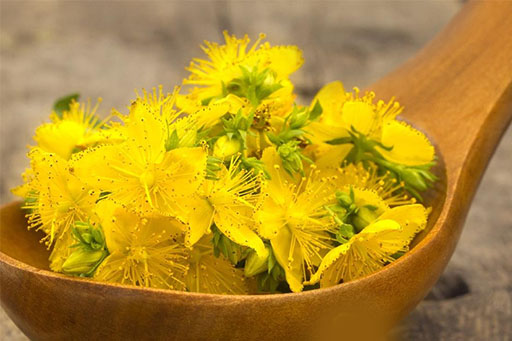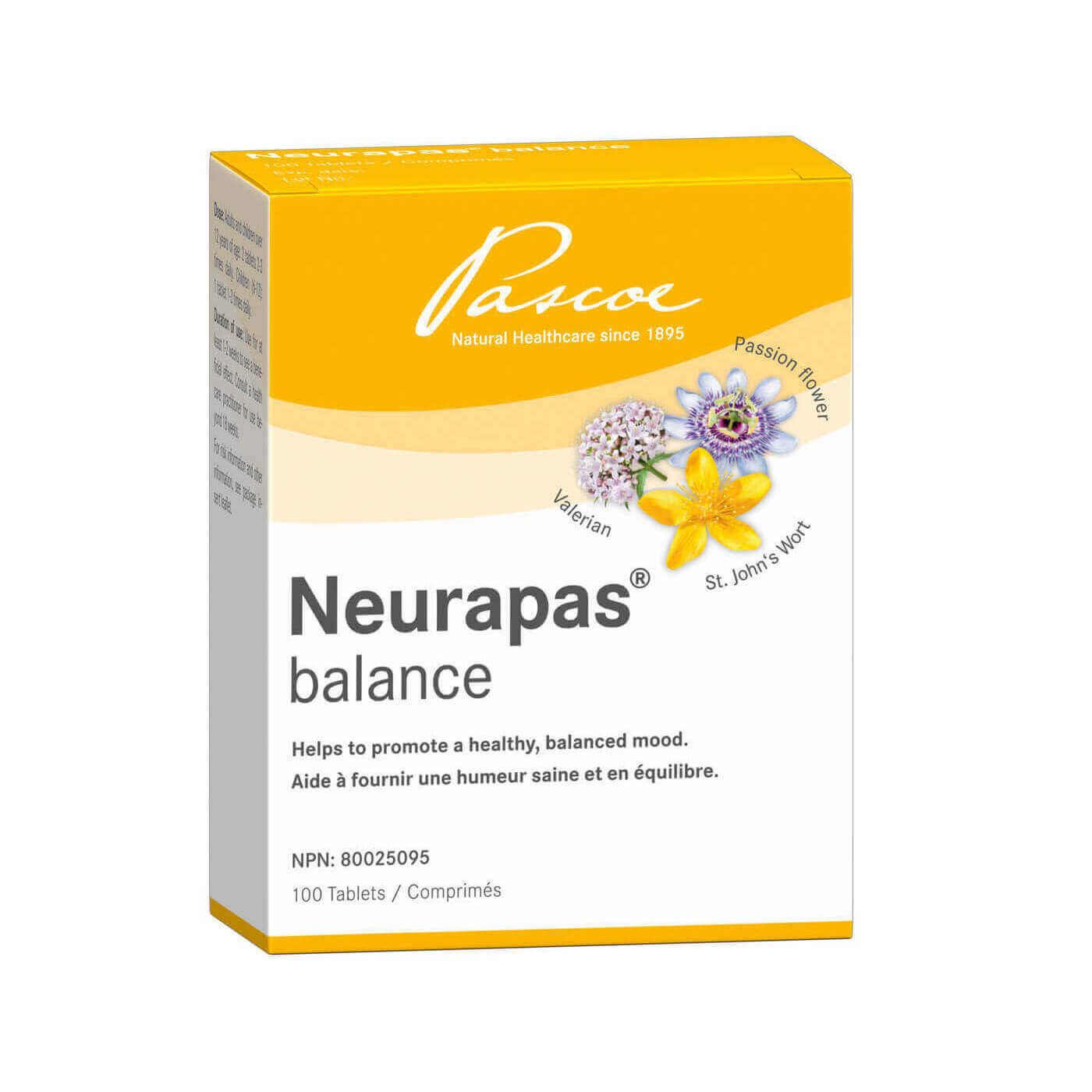Balance Your Mood with St. John's Wort
St. John's wort (Hypericum perforatum) is a herb and flower used to help balance mood and improve health.
Hypericum perforatum is indigenous to Europe and Asia but now thrives in North America. As part of the Hypericaceae family, Hypericum perforatum is a plant that uniquely bears yellow, star-shaped flowers with five petals. While several plants make up the Hypericaceae family, the Hypericum perforatum has been shown to have the most medicinal benefit.
For centuries, St. John's wort (Hypericum perforatum) has been used to support various health and medical conditions. The medicinal properties of hypericum include balancing mood and hormones. St. John's wort also has anti-inflammatory, antiseptic, tonic, anti-microbial and vulnerary (wound healing) properties. Notably, research on St. John's wort has been dedicated to the effects of hypericum on mood disorders. Such that, hypericum is indicated for depressive symptoms, mood disturbances (anxiety or stress), dysthymia, ADHD, OCD, and seasonal affective disorder.


Depression is a common but serious mood disorder. It significantly effects how individuals feel, think, and engage in healthy daily activities. There are several forms of depression. Generally, the signs and symptoms are experienced every day for at least two weeks. While emotional and physical symptoms of mild and major depression vary across time and person, they may include:
- Chronic stress, anxiety, mood swings
- Sadness, "empty" mood, irritability
- Feeling hopeless, worthless or helpless
- Loss of interest in hobbies and activities
- Increased fatigue and decreased energy
- Difficulty focusing or concentrating, brain fog
- Insomnia or oversleeping
- Change in appetite or weight gain, digestive problems
- Suicidal ideation
St. John's Wort for Depression
Clinical studies have shown the health benefit of St. John's wort in the treatment of mental health disorders such as mild depression, anxiety, insomnia, and panic attacks. The flowers and leaves of St. John's wort contain the active constituents hyperforin, hypericin, and adhyperforin. Hypericin found in St. John's wort is able to cross the blood-brain barrier and increase levels of dopamine. Dopamine plays a critical role in regulating physical behavior, movement, and healthy emotions. It is a chemical hormone and one of our main neurotransmitters in the brain. It helps us to feel pleasure. It also helps our cognition, focus and interest. Importantly, too much of it or too little affects various parts of the brain. A deficiency is linked to major depression. Hyperforin can also influence the neurotransmitters and acts as a reuptake inhibitor of monoamines for mood enhancing effects.
For individuals looking to naturally increase dopamine, exercise, a healthy diet, vitamins, and supplements are shown to have positive results on health. A diet high in protein is needed to ensure vitamins and minerals produce dopamine and serotonin. The amino acid L-tyrosine, found in protein, is vital in order to synthesize DOPA into dopamine. L-tyrosine and tryptophan are essential amino acids that can not be made by the body and must be supplied through a nutrient-rich diet. Tyrosine and tryptophan can be found in dairy products, or cooking eggs and meat. Tyrosine can also be found in nutrients from nuts, beans, wheat, and oats.
Supplements that may also boost healthy levels of dopamine include vitamin D, magnesium, and omega-3 essential fatty acids. Ultimately, more research needs to be performed into whether the aforementioned supplements are effective. However, clinical studies have shown the herb, St. John's wort, to be as effective as many prescription anti-depressants and selective serotonin reuptake inhibitors (SSRIs).
Clinical Evidence of St. John's wort
A 2016 review of 35 studies suggested that the herb, St. John's wort, may be better than a placebo and as effective as a prescription antidepressant for mild to moderate depression. Findings suggest that St. John's wort improves overall mood and reduces the symptoms of mild and moderate depression better than a placebo. The herb also reduced the symptoms of depression in a similar extent as prescription anti-depressants. In addition, St. John’s wort appeared to have fewer side effects than standard antidepressants and did not reduce sex drive.
In a 6-week controlled trial with 251 participants, St. John's wort decreased depression scores by 57% in comparison to a decrease of 45% in those who took a standard prescription antidepressant. This study reveals the powerful antidepressant affects of St. John's wort with less side effects.
In a controlled study with 241 participants, St. John's wort was as effective as a prescribed antidepressant. 69% experienced a reduction in symptoms of depression while taking the medicinal herb St. John's wort. Similarly, 70% experienced a reduction in symptoms while taking a standard prescription antidepressant.
The evidence-based studies reveal that St. John's wort is an effective herb for the treatment of depression and balancing mood swings with less adverse effects or side effects. Findings suggest that similar to pharmaceutical medicine that treats depressive disorders, the supplement increases the amount of serotonin in the brain and helps with mood regulation to improve health.
How to Take St. John's Wort
The flowers and leaves of St. John's wort are often dried or pressed. The healing herb, St. John's wort, is commonly taken orally in the form of capsules, tea or liquid extract. St. John's wort can also be applied directly to the skin as an oil for external wounds. St. John's wort takes time to build-up in the body and individuals often find relief within four to six weeks of consistent use. Although there is sufficient evidence revealing the health benefits and efficacy of this medicinal herb, it does come with caution. Side effects of the herb, St. John's wort, may include mild anxiety, agitation, dizziness, and insomnia. Importantly, the herbal healing remedy for mood balance has moderate interactions and side effects which is why individuals should always consult a health care provider before taking any supplements, herbs or natural medicine.


With its various mechanisms of action, St. John's wort is uniquely effective in treating depression. Yet, it goes without saying there are many supplements and protocols that have shown to positively effect mood. It would be remiss to recognize their importance for health.
- Fish oil: omega-3 fatty acids found in fish oil have benefit for mood disorders. Omega-3s with high EPA to DHA ratio dosage are most effective. Omega-3s also have anti-inflammatory properties.
- L-theanine: the supplement L-theanine has been shown to improve sleep, ease anxiety and ameliorate symptoms of depression as theanine boosts GABA.
- Green tea: studies have shown green tea consumption increases dopamine and serotonin and reduces symptoms of depression.
- GABA: the supplement is a mood enhancer as it eases anxiety and stress.
- Rhodiola: a remedy that improves symptoms of depression such as stress, fatigue, physical and mental performance is rhodiola.
- Vitamin D and Magnesium: a deficiency in vitamin D and magnesium both impairs and prolongs recovery from depression.
- Rosemary: studies have shown that it may improve memory, sleep, anxiety, and reduce depression. Cooking with or consuming rosemary tea may have benefit, but more placebo-controlled trials are needed.
- Antioxidants: antioxidant supplement therapy as an adjuvant therapy has shown to be useful in stress-induced psychiatric disorders.
- Passion flower: a remedy shown effective in treating symptoms of depression including anxiety disorders, insomnia, panic attacks, and nervous disorders. Passion flower has no known interactions.
- B-complex: vitamin B-12, B3 (Niacinamide) and other multivitamins produce brain chemicals that affect mood. Low levels of vitamins have been linked to depression.
- Aromatherapy: In combination with medication, essential oils may trigger smell receptors in your nose that sends signals to a part of the brain that controls mood.
- Exercise and nutrition: regular exercise helps to release endorphins and has a mood enhancing effect. Nutrition that focuses on protein and carbohydrates to balance blood sugar levels also has positive health benefits for depressive illnesses and individuals well-being.
Before taking St. John's wort, or any other FDA approved herbal medicines, vitamins or medication to promote health and healing, always consult your health care provider to determine the best course of treatment and supplementation, and never self diagnose.




